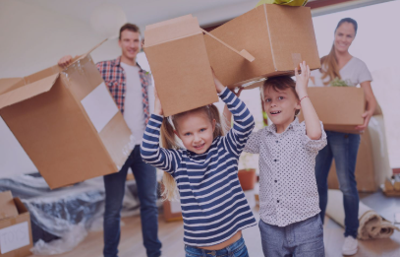
For any family, moving can be a challenging chore; when children are involved, the complexity becomes even more. Of households with children, 13.7% migrated in 2024, more than for those without children at home. Approaching the relocation with compassion, planning, and honest communication will help to guarantee a seamless transition for your family.
Knowing how relocation affects kids
Regular moves might influence kids' social skills and academic success. Every extra move is linked to drops in math and reading performance, more negative social interactions, and more emotional and behavioral issues. The first stage in reducing possible difficulties is to acknowledge them.
Getting your kids ready for the relocation
Initiate the discussion early
Children require time to absorb major changes. Involving children in talks about the relocation as soon as preparations are set enables them to intellectually and emotionally adjust. Open communication lets them voice worries and inquiries, hence promoting involvement.
Include them in the procedure
Giving kids age-appropriate duties during the relocation might help them and lower stress. Involvement promotes a feeling of control, whether it's selecting décor for their new room or packing their possessions. Visit the new area together.
Explore the new area jointly
Should you be able, bring your kids to investigate the new area before you relocate. Getting children acquainted with nearby parks, schools, and attractions will help to reduce anxiety about the unknown and generate enthusiasm.
Keeping relationships and routines
Being consistent is essential
Keeping consistent routines offers stability in the midst of change. Maintaining regular eating patterns, bedtimes, and family customs will allow kids to feel safe during the change.
Promote continuous friendships
Helping youngsters stay in touch with friends from their former site can help them to cope with grief. Maintaining these crucial ties may be aided by using technology for video calls or trip planning.
Dealing with mental well-being
Acknowledge their emotions
From joy to sorrow, children can feel many different emotions. It is vital to acknowledge and validate these emotions. Promote honest conversations in which they may express their ideas and worries. Encourage honest conversations in which they may express their ideas and worries.
Give comfort
Tell your kids it's natural to be anxious about the relocation. Help them to change their point of view by assuring them of the good things like new friends and experiences.
Useful moving advice
Declutter together
Sort through items using the move as a guide. For kids, deciding what to keep, give away, or throw away can be a healing journey that helps them feel finished.
Pack necessities apart
To keep each child comforted throughout the relocation, make sure they have a personal bag containing their preferred possessions, including toys or books.
Engage expert movers
Consider employing experts to help you lower mental and physical strain. This lets you concentrate more on your children's needs during the change. This helps you to concentrate more on your children's needs during the transition.
Factors in car relocation
Plan the trip
Should your relocation include long-distance driving, make sure your car is prepared for the journey. Plan rest periods and schedule maintenance inspections to keep kids comfortable. Plan rest stops and schedule maintenance checks to keep kids comfortable.
Moving several cars
Families with more than one automobile should choose whether to drive both or use a car transportation company. Distance, expense, and personal choice will guide this choice. This choice is based on distance, cost, and personal preference.
Adjusting to the changed surroundings
Make their area unique
Let kids arrange their new rooms how they choose. This freedom lets them feel more in charge and at home. Interact with the community.
Interact with the community
Attend local events or volunteer with community organizations to enable your kids to meet new people and fit into the area. Encourage your kids to meet new people and fit into the area by attending local events or joining community organizations.
Expert analysis
Child psychologist Dr. Emily Rosen suggests, "Children thrive on predictability. Keeping some routines throughout a relocation can help them to adjust to new environment by providing the consistency they require.”
Though with careful planning and compassion, moving with kids may be a great family experience as it offers special difficulties. You set the stage for a seamless transition into your new home by including your children in the process, keeping routines, and meeting their emotional needs.




(0) comments
Welcome to the discussion.
Log In
Keep it Clean. Please avoid obscene, vulgar, lewd, racist or sexually-oriented language.
PLEASE TURN OFF YOUR CAPS LOCK.
Don't Threaten. Threats of harming another person will not be tolerated.
Be Truthful. Don't knowingly lie about anyone or anything.
Be Nice. No racism, sexism or any sort of -ism that is degrading to another person.
Be Proactive. Use the 'Report' link on each comment to let us know of abusive posts.
Share with Us. We'd love to hear eyewitness accounts, the history behind an article.